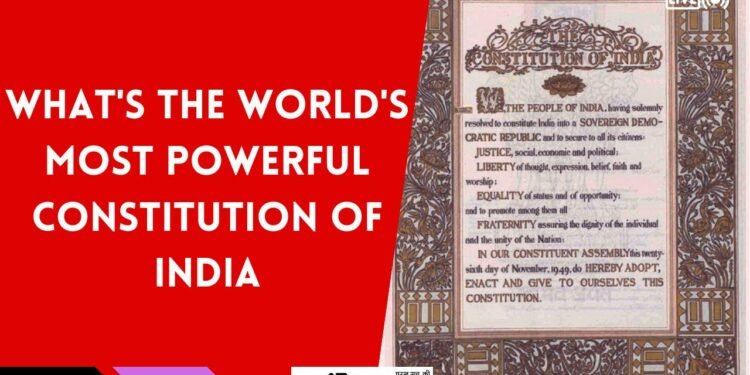HIGHLIGHTS
The Constitution of India is the supreme law of India that lays down the framework and principles of governance for the country. Here’s some information on its drafting, adoption, and contents:
Drafting Committee of Constitution of India:
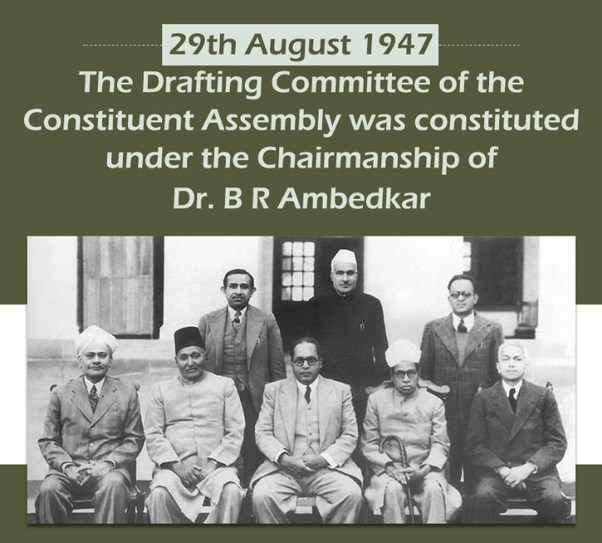
The Constitution of India was drafted by a committee of experts known as the Constituent Assembly. The drafting committee was chaired by Dr. B.R. Ambedkar, and its members included prominent leaders and intellectuals of the time.
Constituent Assembly: The Constituent Assembly was established on December 9, 1946, as a representative body to draft the Constitution. It had a total of 389 members, who were elected by the provincial assemblies and nominated by the princely states.
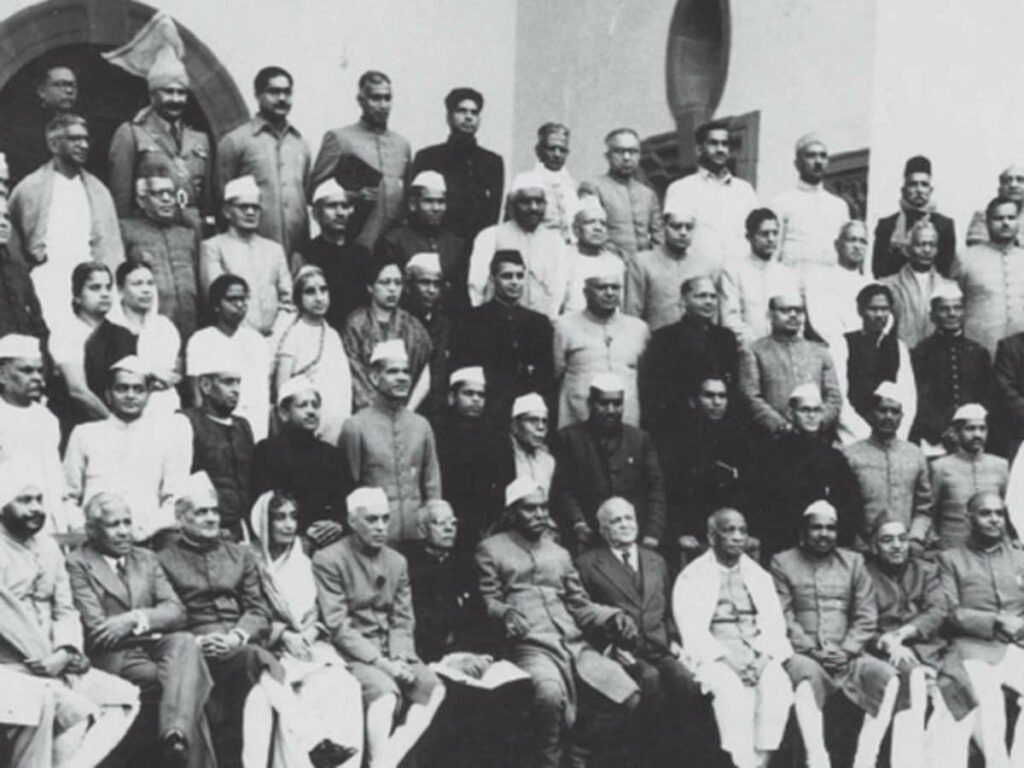
Timeline: The Constituent Assembly took almost three years to draft the Constitution. It commenced its work on December 9, 1946, and adopted the Constitution on November 26, 1949.
Content: The Constitution of India is a comprehensive document that covers various aspects of governance, fundamental rights, directive principles, powers of the government, and more. Here are some key topics covered in the Constitution,
A Preamble: The Preamble outlines the basic ideals and objectives of the Indian Constitution, including justice, liberty, equality, and fraternity.
Fundamental Rights: The Constitution guarantees several fundamental rights to Indian citizens, including the right to equality, freedom of speech and expression, right to life and personal liberty, and more.
Directive Principles of State Policy: These principles provide guidelines to the government to work towards social justice, economic welfare, and the overall development of the country.
The Structure of Government: The Constitution establishes a parliamentary system of government with a President as the head of state and a Prime Minister as the head of government. It defines the powers and responsibilities of the legislature, executive, and judiciary
Federal System: The Constitution delineates the division of powers between the central government and the states, creating a federal system where both levels of government have specified areas of authority.
Amendment Process: The Constitution provides a mechanism for its amendment, allowing changes to be made to the document to suit the evolving needs of the nation. Amendments require the approval of a two-thirds majority in Parliament.
Adoption: After the drafting of the Constitution, it was presented and debated in the Constituent Assembly. On November 26, 1949, the Constitution was formally adopted, and it came into effect on January 26, 1950, marking India’s transition to a republic.
The Constitution of India is one of the lengthiest written constitutions in the world, consisting of a Preamble and 470 articles organized into 25 parts, along with several schedules and amendments. It has played a crucial role in shaping the governance, rights, and democracy in India since its adoption.
Need of Constitution in India
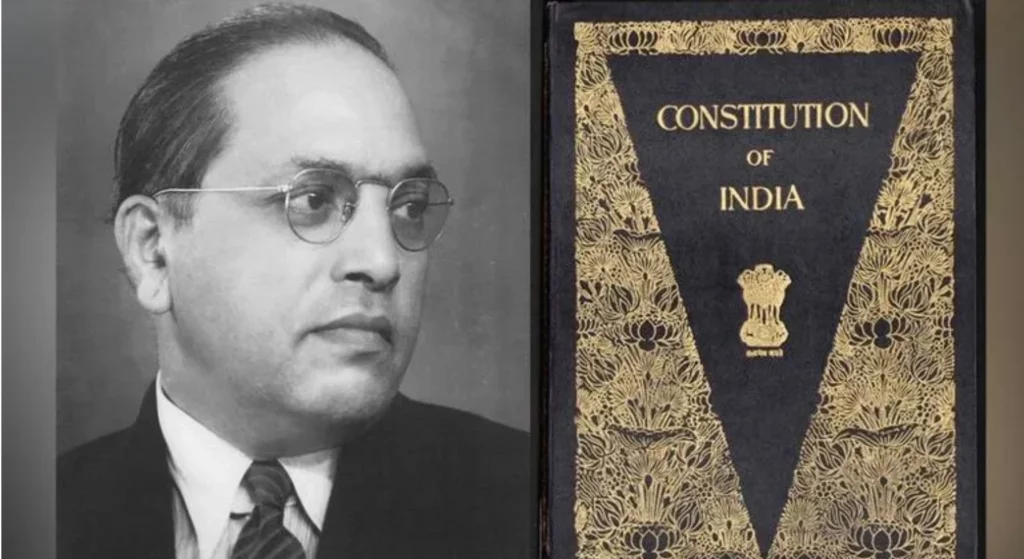
The Constitution of India serves several important purposes and fulfills various needs. Here are some key reasons why India needed a constitution:
Establishing a Framework for Governance: The Constitution provides a framework for the governance of the country. It defines the structure of government, delineates the powers and responsibilities of various branches, and establishes the relationship between the central government and the states. It sets out the principles and procedures for the functioning of the government machinery.
Protection of Fundamental Rights: The Constitution guarantees fundamental rights to all citizens of India. These rights include the right to equality, freedom of speech and expression, right to life and personal liberty, right to education, and more. The Constitution ensures that individuals have certain inherent rights and protects them from any infringement by the state or other entities.
Ensuring Social Justice: The Constitution of India incorporates Directive Principles of State Policy, which provide guidelines for the government to work towards achieving social justice, economic welfare, and the overall development of the country. These principles aim to reduce social inequalities, improve living standards, and uplift marginalized sections of society.
Safeguarding Democracy: The Constitution establishes India as a sovereign, socialist, secular, and democratic republic. It enshrines the principles of democracy, ensuring free and fair elections, the rule of law, and a system of checks and balances. The Constitution upholds democratic values and protects the rights and freedoms of citizens.
Preserving Unity in Diversity: India is a diverse country with various religions, languages, cultures, and traditions. The Constitution plays a crucial role in maintaining unity and promoting diversity. It guarantees the right to cultural and educational rights to minorities and protects their interests. The Constitution ensures that all citizens are equal before the law, regardless of their background, and fosters a sense of unity among diverse communities.
Providing a Mechanism for Progress: The Constitution of India provides a mechanism for progress and development. It empowers the government to make policies and implement programs for the welfare of the people. The Constitution allows for amendments, enabling it to evolve and adapt to the changing needs and aspirations of the nation.
In summary, the Constitution of India fulfills the need for a framework of governance, protection of fundamental rights, social justice, democracy, unity in diversity, and progress. It serves as a fundamental document that guides the functioning of the nation and ensures the rights and welfare of its citizens.
Importance of the Indian Constitution
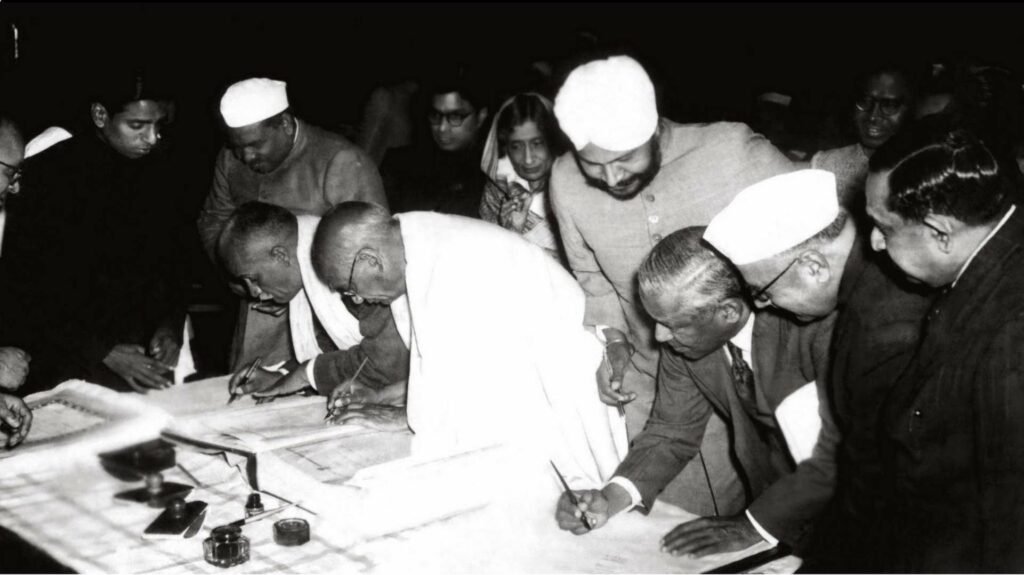
The Constitution of India holds immense importance for the country and its people. Here are some key reasons highlighting the significance of the Indian Constitution:
Protection of Fundamental Rights: The Constitution guarantees fundamental rights to all citizens, including the right to equality, freedom of speech and expression, right to life and personal liberty, and more. These rights are essential for safeguarding individual liberties and ensuring a just and inclusive society.
Rule of Law and Justice: The Constitution establishes the rule of law as a foundational principle of governance. It provides a framework for the administration of justice and ensures that all individuals, including government authorities, are subject to the law. It upholds the principles of fairness, equality, and impartiality in the legal system.
Securing Democracy: The Indian Constitution establishes India as a democratic republic, where the power resides with the people. It provides for free and fair elections, guarantees political participation, and enshrines the principles of representative government. The Constitution ensures that democratic institutions function effectively, and the voice of the people is heard.
Social Justice and Welfare: The Constitution incorporates Directive Principles of State Policy, which provide guidelines for the government to work towards achieving social justice, equitable distribution of resources, and the overall welfare of the people. These principles aim to uplift marginalized sections, eradicate social inequalities, and promote the well-being of society as a whole.
Unity in Diversity: India is a diverse country with various religions, languages, cultures, and traditions. The Constitution plays a crucial role in fostering unity and accommodating diversity. It guarantees the right to cultural and educational rights to minorities, promotes secularism, and provides a platform for the peaceful coexistence of different communities.
Balancing Federalism: The Constitution establishes a federal system of government, where power is divided between the central government and the states. It delineates the powers and responsibilities of both levels of government, ensuring a balance of power and allowing for effective governance and cooperation.
Flexibility through Amendments: The Constitution provides a mechanism for amendments, allowing it to adapt to the changing needs and aspirations of the nation. While upholding its core values, the Constitution can be modified to address emerging challenges, incorporate social progress, and rectify any shortcomings.
Constitutional Supremacy: The Indian Constitution is the supreme law of the land. It establishes the framework for the functioning of all branches of government, ensuring their accountability and adherence to constitutional principles. It serves as a check on the exercise of power and protects against the abuse of authority.
Overall, the Constitution of India is of utmost importance as it ensures the protection of fundamental rights, upholds the rule of law, promotes democracy and social justice, fosters unity in diversity, balances federalism, and provides a stable and adaptable framework for the governance of the nation. It serves as the cornerstone of India’s democratic and pluralistic society, shaping the values and aspirations of its people.


